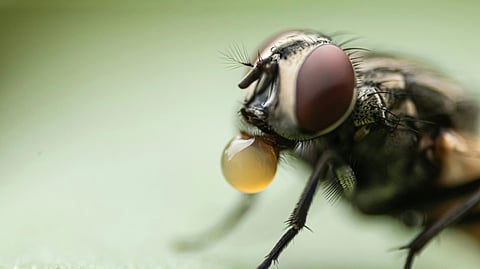The patient had no symptoms, and he had no idea how the fly ended up inside his body as he didn't eat for 24 hours, only clear liquids. The doctors from the University of Missouri School of Medicine wrote in the American Journal of Gastroenterology, "This case represents a very rare colonoscopic finding and a mystery as to how the unharmed fly found its way to the transverse colon."
The doctors are saying that flies lay eggs rarely on fruits and vegetables and that they survive stomach acids, hatch, and infest the intestine. This condition is called intestinal myiasis. According to the CDC, some infected patients are asymptomatic, while others have abdominal pain, vomiting, and diarrhea. Doctors can prescribe antiparasitic medications to clear up the infestation.
This case shows the importance of hygiene. Checking the fruits and vegetables while buying to see if any eggs or insects are present and washing thoroughly before consuming is crucial.
(Input from various media sources)


